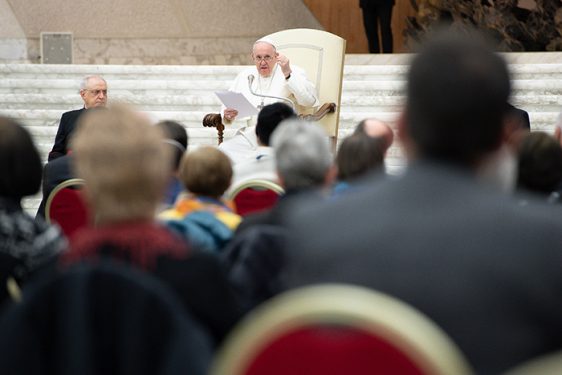
By Inés San Martín
ROME (Crux) — One of the projects most dear to Pope Francis is having the first part of its fourth edition on Friday, before continuing in September.
The Fourth World Meeting of Popular Movements will bring together activists from the most marginalized communities of society in the most visible example of the “popularism” the pontiff has proposed to counter the populism that has been sweeping many nations around the world.
A preparatory meeting is taking place in the Vatican on Friday — via Zoom, due to the pandemic — sponsored by the Dicastery for Integral Human Development.
The Vatican office said the meeting is in response to “the invitation of Pope Francis that the poor and organized communities do not become resigned and to become the protagonists of the change process.”
The World Meeting of Popular Movements — the first of which was held in the Vatican in 2014 — promotes popular movements and organizations coming together to fight “bravely but without arrogance, with determination but without violence, for human dignity, nature, and social justice.”
Among those who will participate in the meeting is Gloria Morales, who arrived in the United States from Mexico as an illegal immigrant when she was 16. Now a U.S. citizen, she works with the PICO Network, a grassroots faith-based social justice network.
“Having the worldwide meeting of the popular movements, especially amidst the COVID-19 crisis, is very important, because it gives people the opportunity to come together, think about and come to conclusions regarding how different popular movements confronted the situation,” she told Crux over the phone on Wednesday. “As Pope Francis said, we either come out better or worse.”
She said she hopes that the outcome of the meeting will be a document on the rights to access to land, jobs, and housing, which will be given to Pope Francis.
“What can we do so that the neediest and most abandoned of communities can also have a chance to thrive in life?” Morales said.
Although critics have accused the “popularism” promoted by the World Meeting of Popular Movements as just a socialist version of populism, Morales said it’s not about socialism, but about doing things right.
She said when assistance is allocated to help the poor, that money should reach the poor instead of remaining in the pockets of a few people. When goods are exported, the people who actually produced them should make enough money to survive.
“In many cases, people don’t have the opportunity to work their own land because there are no economic benefits from doing so,” she said, adding that in many places, including Mexico, laborers also have to factor in the impact of organized crime.
The fact that grassroots movements are coming together with the support of the Vatican, Morales said, means that “I’m not the only person who thinks that a fairer distribution of wealth is possible. And seeing that I’m inspired by my faith in this, having the support of the Holy Father means a lot to me.”
After the first meeting in 2014, the second took place the next year in Bolivia, with Pope Francis taking part and delivering a poignant speech that is often referred to as a “mini-social encyclical.”
During that speech, the pontiff gave the popular movement three major tasks: To place the economy at the service of the people, to unite people on the road to peace and justice, and to defend mother Earth.
The third world meeting took place in the Vatican in 2016.
The fourth meeting will discuss the impact of COVID on the most excluded people and the other dilemmas facing humanity today.
“It makes me very emotional to know that a person like Pope Francis is supporting us, having our back, because it creates even more commitment from the part of each one of us to help the other,” Morales said.
Having seen “many opportunities pass me by” because she didn’t have her papers in order, today she feels motivated to help the over 11 million people in the United States who “came here to make a better life for themselves” but cannot do so because they are “illegal.”
“It’s not OK to criminalize them for the fact that they wanted a better life for their children or because they were fleeing organized crime,” Morales said. “I’ve always had that passion to help migrants, [which is the] reason why in our community we have an office through which we help people become legal citizens.”
“Jesus himself was someone who made people uncomfortable in his decision to help others,” she said. “He gave his last drop of blood to help me, so how could I not try to do the same to help others?”
Morales is convinced that the Catholic Church is “a mother of the people, and its role is to embrace all people, and the pope is not just the pope of Catholics, but for all people.”
Pope Francis, she said, is “making a difference, he’s truly being a pastor and asking his own people to smell like the sheep, to actually do the work, make people uncomfortable, as Jesus did.”
“People don’t always like to hear the truth, and I don’t think that the pope is supporting socialism, but the Church is called to embrace everyone,” she said, referring to the many voices that are critical of the social movements.
“Those who are critical of the pope supporting us, maybe have to ask themselves what are they afraid of … having their money disappear? Being called — or inspired through prayer if they’re believers — to help others, better distribute their wealth through, for instance, paying their workers a fair wage?”
